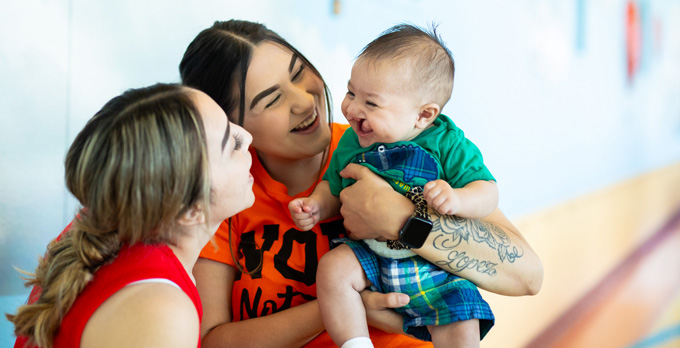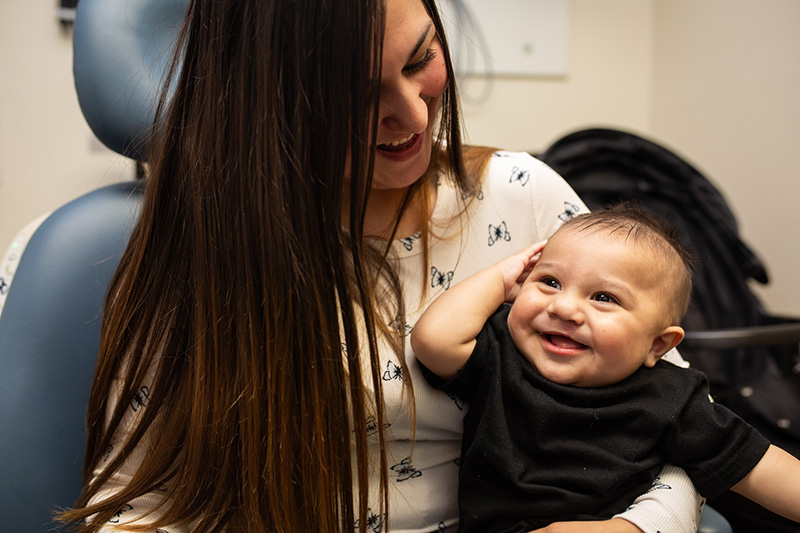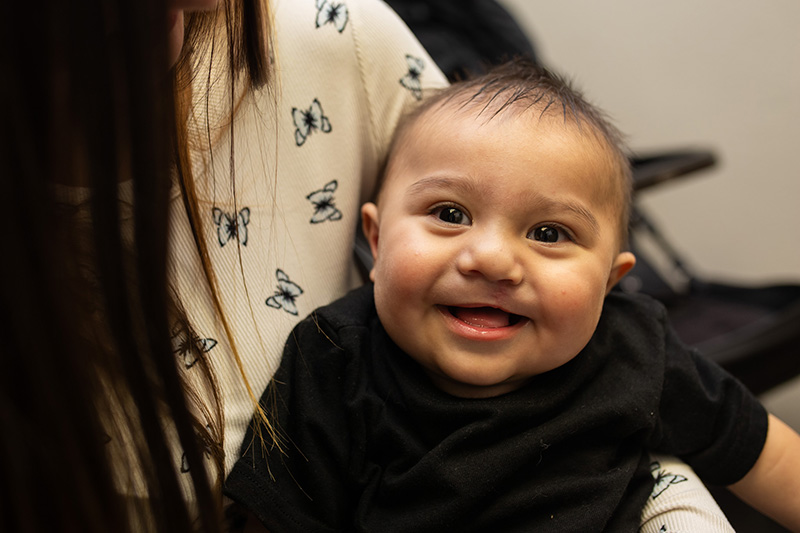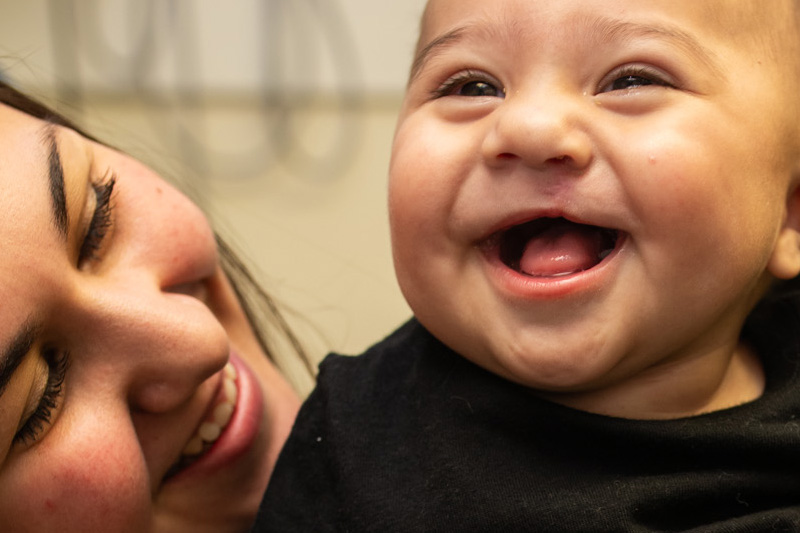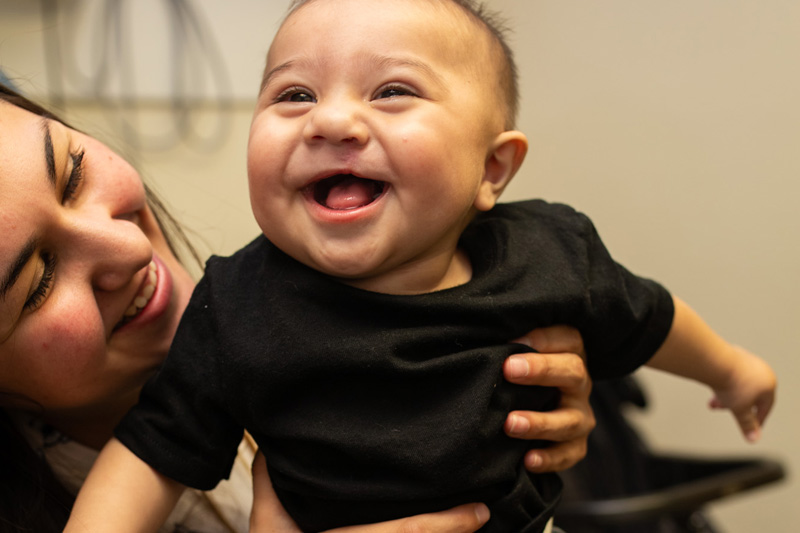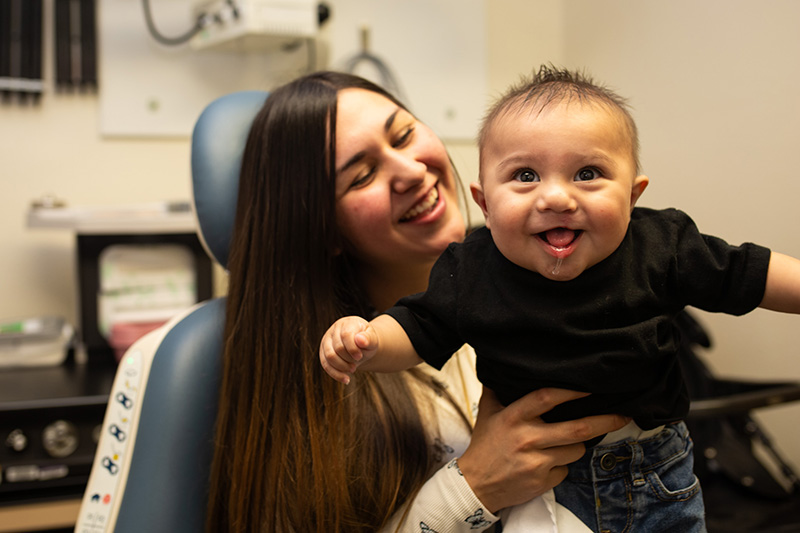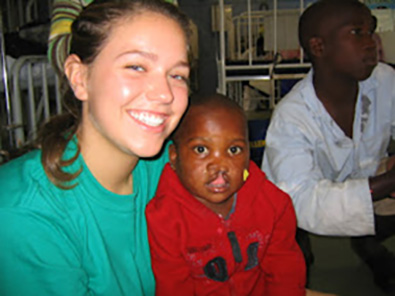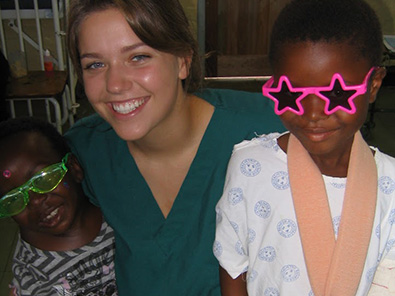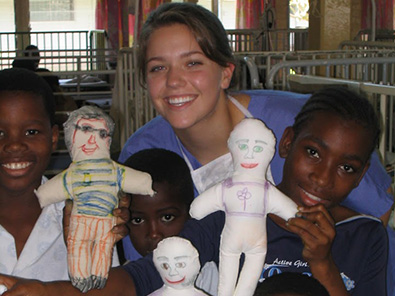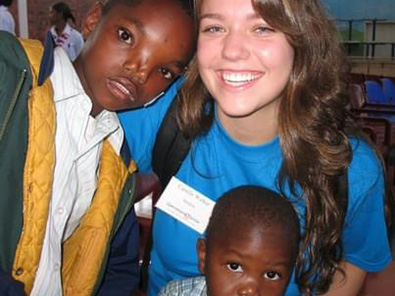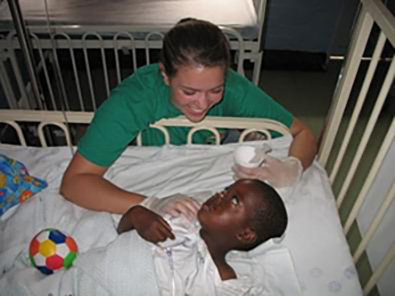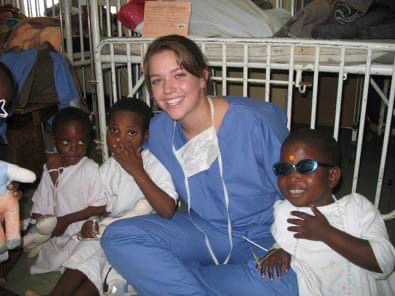“I did not know anything about clefts,” Pfieffer said. “At first, I felt like my world was falling apart. It was really hard for me to hear that. He would come out with half of his mouth gone.”
According to the Centers for Disease Control and Prevention (CDC), a cleft palate forms in the womb during the first nine weeks of pregnancy, when tissues that make up the roof of the mouth do not join together. A cleft lip forms during the first seven weeks of pregnancy, when lip tissues do not join together.
Pfieffer was referred to The University of New Mexico Children’s Hospital Cleft Team one month after her child’s diagnosis.
“It can be really scary to get any kind of news when you're pregnant, that your baby might have some sort of unexpected difference when they are born,” explained Camille Walker, MSN, CPNP-PC, coordinator for the cleft team and nurse practitioner at UNM Children’s Hospital. “One of the really great parts of my job is I can give families hope about the life that they and their child will have when they get this diagnosis.”
Walker gave that hope to Pfieffer and prepared her for the birth of her son, Derik John Gabe Lopez, by showing her photos she took of other babies with his condition who underwent corrective surgery.
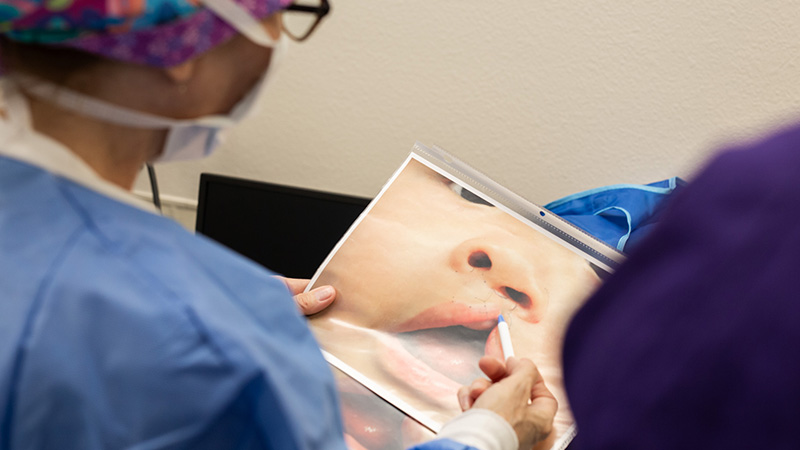 Courtesy Camille Walker, MSN, CPNP-PC
Courtesy Camille Walker, MSN, CPNP-PC
“They are no different, and in those pictures, I saw that,” Pfieffer said. “They are babies. They are beautiful babies.”
But she said no amount of photos, consultations or conversations could have prepared her for the love she would feel for Derik when he was born, and his sweet smile.
“It is the most precious thing in the world, and you are going to get attached to that smile, and you are not going to want to let it go,” Pfieffer said.
But she would let that smile go for the sake of Derik’s health and quality of life.
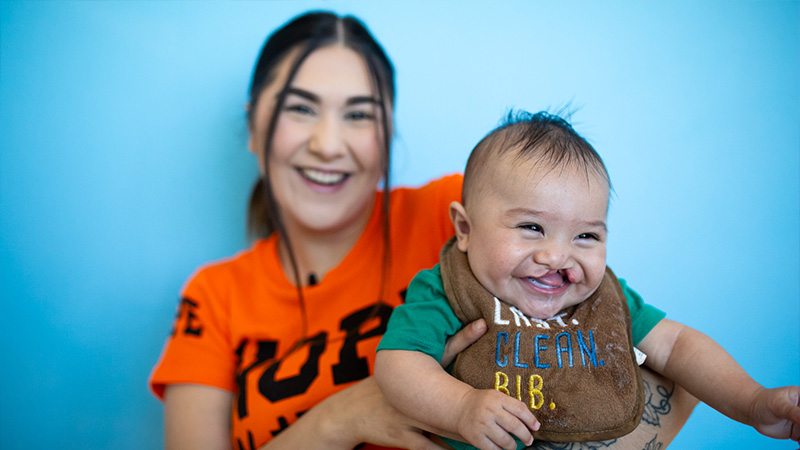 Courtesy Camille Walker, MSN, CPNP-PC
Courtesy Camille Walker, MSN, CPNP-PC
“The cleft can affect the lips, where the teeth come in, the gum line, the hard palate, the soft palate or all of the above,” Walker explained. “It can impact how you eat, how you drink, how you speak. It can affect the hearing and definitely can cause differences in your appearance.”
Walker said the condition is rare, can be genetic and affects about one in 700 children across the United States. Most families she works with have never heard of cleft before the diagnosis.
“The rate of cleft is a little bit higher here in New Mexico, and UNM is the only place these families can go for care,” she said. “It is the only place that offers comprehensive care services. I have a really unique job as a nurse practitioner on this team.”
Pfieffer said Walker was her lifeline through this process, her main source on her son’s condition and primary point of contact—especially when she was released from the hospital after Derik’s birth without established primary care.
“There was no one able to take him,” Pfieffer said. “Camille reassured me that if I was not able to find a primary care doctor, that I was able to take him to the UNM Children’s Hospital Cleft Team for his first well check.”
“They also watched him eat that day,” she continued. “They squeezed him into a schedule they did not really have time for, and they got him in to do everything that they needed to do.”
When Derik was still struggling to eat and rapidly dropping weight weeks later, Walker and her team were there again. Pfieffer said they changed his formula, his bottle and oversaw his care for four days at the UNM Children’s Hospital, until he put weight back on. They also performed Derik’s first major cleft procedure at five months old.
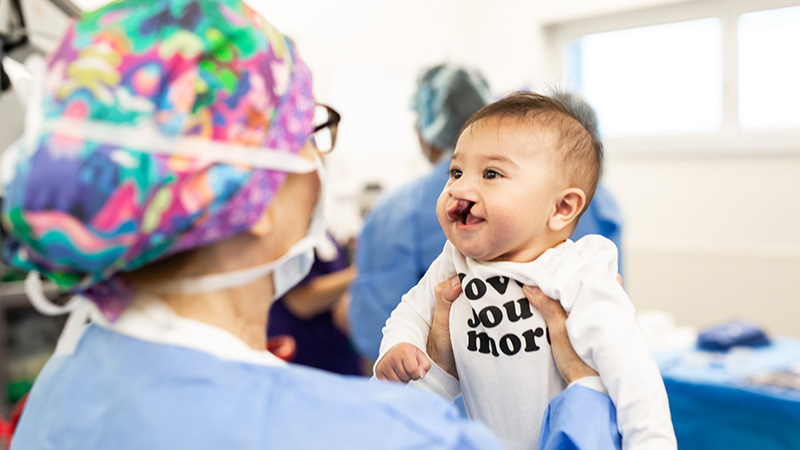 Courtesy Camille Walker, MSN, CPNP-PC
Courtesy Camille Walker, MSN, CPNP-PC
“I handed him back to the team,” Pfieffer said through tears, as she recalled the moment. “My heart just broke into a thousand pieces. I did not want to let him go. I sat there for eight hours and missed him and smelled his blankets. It was the scariest time of my life to see how many doctors and nurses were right there to take him back to a room.”
In a follow-up interview—the day after Derik’s surgery—Pfieffer said it comforted her to know Walker was there, along with the team and surgeon she had grown to trust and rely on. As nervous as she was about the procedure, recovery, and what a new routine at home would look like for Derik, she noticed his instant improvement.
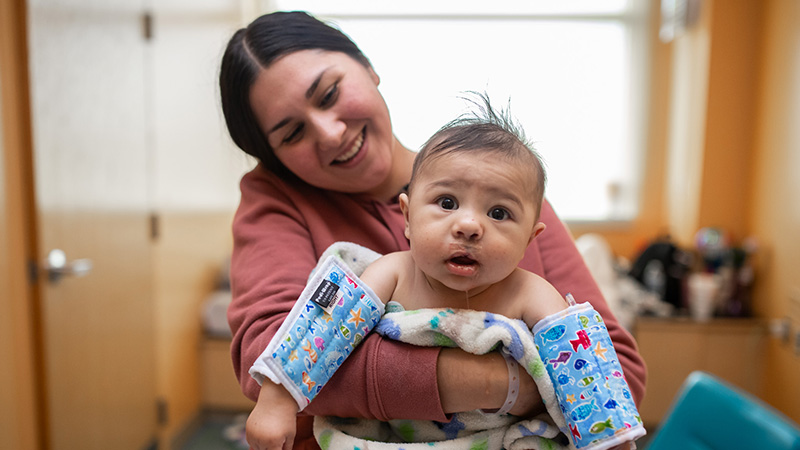 Courtesy Camille Walker, MSN, CPNP-PC
Courtesy Camille Walker, MSN, CPNP-PC
“I feel like a weight is lifted off of both of our shoulders,” Pfieffer said. “The breathing is going to be better. The eating is going to be better. Everything is going to be better.”
She explained how this experience changed her as well.
“I've learned a lot about my strength,” she said. “It just showed me that I'm stronger than I thought. I held it all together.”
With continued support from the cleft team, Derik has healed from surgery. At his one-month post-op visit in late September, Walker said he had noticeably gained weight. Pfieffer said she is relieved his eating has improved.
Derik will have his next major surgery shortly after his first birthday. His condition will require several more operations throughout his life.
“There is no greater satisfaction for me as a nurse practitioner than to see Derik thriving,” Walker said. “It is an honor to take care of these children and to be a part of their story. The patients and the families are the ones doing the hard work. They are walking a different path than everyone else, and I love being a part of this. Derik and his mom are so special to me. I am inspired by both of their strength. I can’t wait to watch Derik grow up with our team cheering him on.”
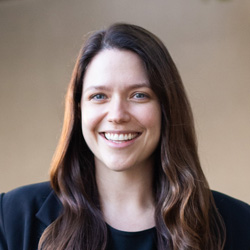
I first learned about clefts as a high school student here in Albuquerque. A beloved teacher introduced me to a non-profit group that provided cleft surgeries around the world. When I was 17, I was invited to go with a surgical team to Africa. I was exposed to hundreds of children who did not have access to cleft care and were finally able to get surgery and other important care. That trip changed my life. I decided to pursue a career in nursing and eventually became a pediatric nurse practitioner. It is now 17 years since that trip, and I get to work with these children and families every day. It turns out that I do not need to go across the world to help people with cleft. I can do it right here in New Mexico and in my own community.
Celebrating Advanced Practice Providers
- Physician assistants
- Nurse practitioners
- Certified nurse anesthetists
- Clinical nurse specialists
- Certified nurse midwives
- Certified anesthesiologist assistants
- Optometrists
Follow our social media pages throughout the week to learn more about Advanced Practice Providers and the work they do for UNM Health and Health Sciences.
